- Regulatory Status
- RUO
- Other Names
- Platelet factor 4, PF4, PF-4, Oncostatin A, Ironplact
- Ave. Rating
- Submit a Review
- Product Citations
- publications
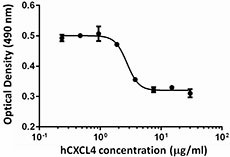
-

Inhibition of human FGF-basic-dependent proliferation of HUVEC by human CXCL4. -

Human CXCL4 inhibits human FGF-basic dependent proliferation of HUVEC cells, in a dose dependent manner. BioLegend’s hCXCL4 product was compared side-by-side to the leading competitor’s equivalent product.
| Cat # | Size | Price | Quantity Check Availability | Save | ||
|---|---|---|---|---|---|---|
| 550904 | 25 µg | 253 CHF | ||||
| 550906 | 100 µg | 686 CHF | ||||
CXCL4, also known as platelet factor 4 (PF-4), is one of the most abundant platelet chemokines and has several biological functions depending on the cell type. CXCL4 is predominantly synthesized in megakaryocytes, stored in the α-granules of platelets, and released as a tetramer at micromolar concentrations upon platelet activation. CXCL4 has both procoagulant and anticoagulant activities. CXCL4 can bind heparin and neutralize the anticoagulant effect of heparin. On the other hand, CXCL4 inhibits factor XII, and vitamin K dependent coagulation factor, and stimulates activated protein C generation. CXCL4 is a potent tumor inhibitor because it can inhibit endothelial cell migration, proliferation, and in vivo angiogenesis through interfering with the angiogenic effect of growth factors such as FGF and VEGF. CXCL4 binds directly to FGF-β and inhibits its dimerization, which is required for receptor activation. Also, it has been suggested that binding of CXCL4 to polysulfated GAGs can interfere with activation of VEGFR and FGFR. CXCL4 also promotes inflammatory responses. For example, CXCL4 can activate granulocytes and induce monocytes to differentiate into macrophages and antigen-presenting cells. It has been reported that CXCL4 is deposited early in atherosclerotic lesions, and the presence of CXCL4 at atherosclerotic lesions has been associated with plaque progression. Genetic deletion of CXCL4 in Apo-E-/- mice is accompanied with reduced atherogenesis. CXCL4L1, a CXCL4 variant which differs in only three amino acids in its mature form, has been identified. CXCL4 and CXCL4L1 have different subcellular localization and are secreted in a differentially regulated manner. Human CXCL4 binds to CXCR3A and CXCR3B receptor variants, and it should be noted that variant B has not been described in mice. CXCR3A acts as a chemotactic receptor for human cells via CXCL4, and CXCR3B has an antiapoptotic effect in endothelial cells. CXCR3A might be responsible for the chemotactic effect of CXCL4 in mice.
Product DetailsProduct Details
- Source
- Human CXCL4, amino acids Glu32 - Ser101 (Accession# P02776.2), was expressed in E. coli.
- Molecular Mass
- The 70 amino acid recombinant protein has a predicted molecular mass of approximately 7.8 kD. The DTT-reduced and non-reduced protein migrates at approximately 11 kD by SDS-PAGE. The predicted N-terminal amino acid is Glu.
- Purity
- >97%, as determined by Coomassie stained SDS-PAGE.
- Formulation
- 0.22 µm filtered protein solution is in PBS, pH 7.4.
- Endotoxin Level
- Less than 0.01 ng per µg cytokine as determined by the LAL method.
- Concentration
- 10 and 25 µg sizes are bottled at 200 µg/mL. 100 µg size and larger sizes are lot-specific and bottled at the concentration indicated on the vial. To obtain lot-specific concentration and expiration, please enter the lot number in our Certificate of Analysis online tool.
- Storage & Handling
- Unopened vial can be stored between 2°C and 8°C for up to 2 weeks, at -20°C for up to six months, or at -70°C or colder until the expiration date. For maximum results, quick spin vial prior to opening. The protein can be aliquoted and stored at -20°C or colder. Stock solutions can also be prepared at 50 - 100 µg/mL in appropriate sterile buffer, carrier protein such as 0.2 - 1% BSA or HSA can be added when preparing the stock solution. Aliquots can be stored between 2°C and 8°C for up to one week and stored at -20°C or colder for up to 3 months. Avoid repeated freeze/thaw cycles.
- Activity
- The ED50 is 2 - 5 µg/ml, as determined by a dose-dependent inhibition of human FGF-basic-dependent proliferation of HUVEC cells.
- Application
-
Bioassay
- Application Notes
-
BioLegend carrier-free recombinant proteins provided in liquid format are shipped on blue-ice. Our comparison testing data indicates that when handled and stored as recommended, the liquid format has equal or better stability and shelf-life compared to commercially available lyophilized proteins after reconstitution. Our liquid proteins are verified in-house to maintain activity after shipping on blue ice and are backed by our 100% satisfaction guarantee. If you have any concerns, contact us at tech@biolegend.com.
Antigen Details
- Structure
- Chemokine
- Distribution
-
CXCL4 is expressed mainly by megakaryocytes and platelets. Some other cell type including smooth muscle cells, microglia, and macrophages. T cells can also express low levels of CXCL4.
- Function
- CXCL4 blocks platelet coagulation, inhibits hematopoiesis, induces inflammatory response, and has angiostatic activity. CXCL4 chemoattracts neutrophils, monocytes, fibroblasts, and T cells. CCL5 heterodimerizes with CXCL4 and enhances its effect on monocyte recruitment. CXCL4 is released in response to protein kinase C activation.
- Interaction
- Endothelial cells, T cells, neutrophils, monocytes, and fibroblasts.
- Ligand/Receptor
- CXCR3A, integrins, and chondroitin sulfate proteoglycan.
- Biology Area
- Angiogenesis, Cell Biology, Cell Cycle/DNA Replication, Immunology, Innate Immunity
- Molecular Family
- Cytokines/Chemokines
- Antigen References
-
1. Rabellino EM, et al. 1981. J. Exp. Med. 154:88.
2. Gentilini G, et al. 1999. Blood 93:25.
3. Wang Z and Huang H. 2013. Cancer Lett. 331:147.
4. Maione TE, et al. 1990. Science. 247:77.
5. Pilatova K, et al. 2013. J. Hematol. Oncol. 24:42.
6. Lasagni L, et al. 2003. J. Exp. Med. 197:1537.
7. Perollet C, et al. 1998. Blood 91:3289.
8. Scheuerer B, et al. 2000. Blood 95:1158.
9. von Hundelshausen P, et al. 2005. Blood 105:924.
10. Mueller A, et al. 2008. J. Leuko. Biol. 83:875. - Gene ID
- 5196 View all products for this Gene ID
- UniProt
- View information about CXCL4 on UniProt.org
Related Pages & Pathways
Pages
Related FAQs
- Why choose BioLegend recombinant proteins?
-
• Each lot of product is quality-tested for bioactivity as indicated on the data sheet.
• Greater than 95% Purity or higher, tested on every lot of product.
• 100% Satisfaction Guarantee for quality performance, stability, and consistency.
• Ready-to-use liquid format saves time and reduces challenges associated with reconstitution.
• Bulk and customization available. Contact us.
• Learn more about our Recombinant Proteins. - How does the activity of your recombinant proteins compare to competitors?
-
We quality control each and every lot of recombinant protein. Not only do we check its bioactivity, but we also compare it against other commercially available recombinant proteins. We make sure each recombinant protein’s activity is at least as good as or better than the competition’s. In order to provide you with the best possible product, we ensure that our testing process is rigorous and thorough. If you’re curious and eager to make the switch to BioLegend recombinants, contact your sales representative today!
- What is the specific activity or ED50 of my recombinant protein?
-
The specific activity range of the protein is indicated on the product datasheets. Because the exact activity values on a per unit basis can largely fluctuate depending on a number of factors, including the nature of the assay, cell density, age of cells/passage number, culture media used, and end user technique, the specific activity is best defined as a range and we guarantee the specific activity of all our lots will be within the range indicated on the datasheet. Please note this only applies to recombinants labeled for use in bioassays. ELISA standard recombinant proteins are not recommended for bioassay usage as they are not tested for these applications.
- Have your recombinants been tested for stability?
-
Our testing shows that the recombinant proteins are able to withstand room temperature for a week without losing activity. In addition the recombinant proteins were also found to withstand four cycles of freeze and thaw without losing activity.
- Does specific activity of a recombinant protein vary between lots?
-
Specific activity will vary for each lot and for the type of experiment that is done to validate it, but all passed lots will have activity within the established ED50 range for the product and we guarantee that our products will have lot-to-lot consistency. Please conduct an experiment-specific validation to find the optimal ED50 for your system.
- How do you convert activity as an ED50 in ng/ml to a specific activity in Units/mg?
-
Use formula Specific activity (Units/mg) = 10^6/ ED50 (ng/mL)
 Login / Register
Login / Register 







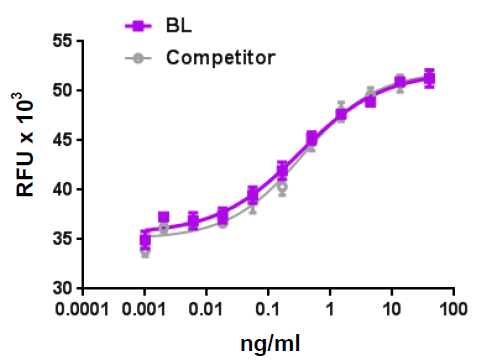
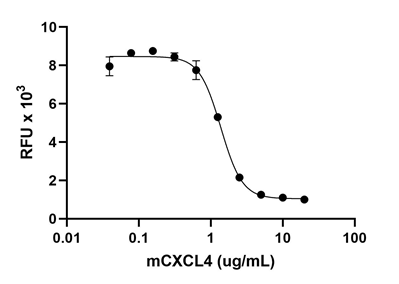
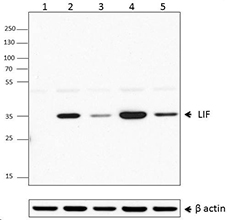
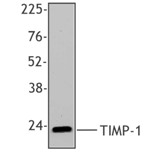



Follow Us